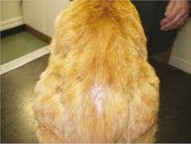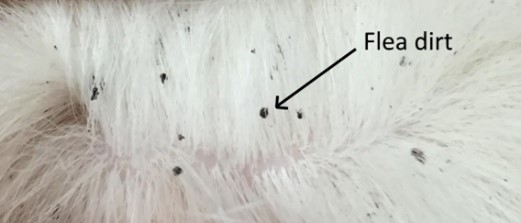Return to article List
As the weather is warming up, we are seeing an increasing number of pets with flea bite hypersensitivity dermatitis. Some pets can tolerate a few fleas without showing signs of itchiness but once they develop allergies to the flea saliva, the itch escalates. Any cat or dog that has had previous exposure to flea bites can become allergic to them, much like us with bee or wasp stings.

Fleas are not host-specific so can also be carried by wildlife and rodents. Humans can be bitten by fleas but thankfully they don’t live on us! An adult flea can lay 50 eggs and the eggs can lie dormant in little nooks and crannies for up to 2 years. The eggs will hatch when conditions are right; the warmth and humidity in Northland makes the perfect environment.
Dogs tend to get itchy along their lower back/tail area. Often, they will have a rash and hair loss from the scratching. Some dogs become so itchy they lose weight and miss out on valuable rest time.
 Cats tend to consume the offending fleas if there is not a large burden, but the flea droppings are a tell-tale sign of exposure and can be seen as tiny black specks in the fur. Cats can present with flea allergy in a few different ways. They may have a bald tummy or back from overgrooming because of the itchiness or develop little bumps under the skin known as miliary dermatitis.
Cats tend to consume the offending fleas if there is not a large burden, but the flea droppings are a tell-tale sign of exposure and can be seen as tiny black specks in the fur. Cats can present with flea allergy in a few different ways. They may have a bald tummy or back from overgrooming because of the itchiness or develop little bumps under the skin known as miliary dermatitis. They may have large open sores which often have a secondary bacterial infection or crusting around the head or neck. With cats it is impossible to differentiate flea allergy from food and environmental allergies as they all present with similar symptoms.
They may have large open sores which often have a secondary bacterial infection or crusting around the head or neck. With cats it is impossible to differentiate flea allergy from food and environmental allergies as they all present with similar symptoms.
Prevention is better than cure! A flea does most of its feeding within the first 5 mins on the host. Effective flea control is the best way to avoid allergies occurring in the first place. Once allergies develop there are often secondary infections and inflammation that needs to be treated to bring relief from the itch.
Luckily there are some highly effective flea-killing products. We now have spot-on products for use in cats that are effective for 3 months . In dogs we have oral products that last for 3 months and spot-on products that last for 6 months. These also deal to ticks, Demodex and Sarcoptes mites (mange). There are many products on the market that fleas have developed resistance too so please talk to your vet if you are unsure of what to use.
Make sure that you treat all the animals in the household and if you have noticed fleas be sure to flea bomb the house to kill any eggs in the environment.
Return to article List